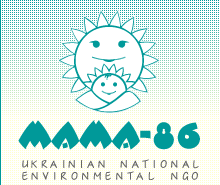“Kyiv-2003” Project
The Fifth Ministerial Conference “Environment for Europe” took place in May 2003. With a purpose of preparation of Ukrainian public for this event, in particular raising awareness and understanding of the issues that will be discussed at the Conference, All-Ukrainian Environmental NGO “MAMA-86” in cooperation with All-Ukrainian Coalition of Environmental NGOs “Alter-Eco” and Stakeholder Forum for Our Common Future (UK) with financial contribution of Community Fund implemented “Kyiv-2003” Project.
Participation in the “Kyiv-2003” project was the right opportunity for Ukrainian NGOs and public concerned over its future to take part in development of pan-European environmental policy.
The network of 56 environmental NGOs that represent all regions of Ukraine was established under “Kyiv-2003” Project. “MAMA-86-Kyiv” and five regional coordinators managed activity of the local project partners.
Goal:
- involving of public in the process of preparation for the Fifth Ministerial Conference “Environment for Europe” to be held in Kyiv in 2003;
- raising public awareness on the “Environment for Europe” process;
- giving the opportunity to discuss the most important environmental problems of Ukraine in the context of preparation for the Conference.
Mainstreaming Project Activity:
- researching existing environmental legislation and practice of public participation in decision making on environmental matters;
- facilitating NGO access to information and cooperation with local and national authorities, scientific society and business in order to develop environmental policy in Ukraine;
- informing on the “Kyiv-2003” Project activity and the “Environment for Europe ” process through the project web-site kyiv-2003 .org and information-analytical bulleting “Kyiv-2003”;
- holding regional seminars that contributed in better understanding of sustainable development issues and progress of the “Environment for Europe ” process by local environmental NGOs and representatives of other groups of society.
Project results
1. Raising Awareness of the “Environment for Europe” Process and the Kyiv Conference
Informational campaign was the main project element. Information, that was important and, at the same time, difficult, mixed with professional terms, stated in scientific or legal manner, was over-interpreted, adapted, commented and then transferred at the local level in the workshops, trainings, lectures, project bulletin and web-site.
The wide information dissemination was fostered by a campaign for mass media involvement to cover the progress in preparation for the Kyiv Conference, as launched by the project partners. Due to this event, around 100 articles, 10 TV programmes and 25 radio broadcasts were in place that highlighted the specific agenda items of the Kyiv Conference, its significance on the European scale and for Ukraine, in particular.
2. Ensuring Participation in Decision-Making
In addition to raising awareness of the project partners and public, we also collected, analysed, and processed information and opinions of public, NGOs, scientists and experts as well as promoted transferring of these facts, suggestions, opinions, and analysis to the working groups, which worked on development of the Conference documents and to other executives bodies.
Due to the project activities, its partners could enforce their right of participation in the environmental decision-making internationally. The most evident example is involvement of a wide range of interested organisations in discussing of the draft Carpathian Convention. As a result, numerous comments and proposals were taken into account while drawing up the Carpathian Convention that was signed at the Kyiv conference. The fruitful activity of regional partners from the Western project region, coordinated by Yu. Vassidlov (Association “Nash Dim”), showed that willingness, professionalism and diligent work were the key factors for enforcing the right of participation in decision-making on condition that relevant governmental authorities, certainly, were willing to co-operate.
3. Capacity Building of Project Network Branches
The NGOs, involved in the project activities, had opportunities for:
- obtaining information about preparations for the Kyiv Conference and the news about the environmental policy development process at the national and European levels;
- exchanging experience with organisations worked in other regions of Ukraine;
- establishing co-operation with representatives of other society sectors;
- participating in trainings.
4. Clarifying the Right of Access to Information, Public Participation in Decision-Making, Access to Justice in Environmental Matters
A good deal of articles of Information-analytical bulletin “Kyiv-2003” were dedicated to clarification of fundamental rights enshrined in the Aarhus Convention. Participants of the regional workshops regularly shared their experience in implementing the Convention provisions, while the experts provided comments and advice regarding this issue.
Taking into account importance of dissemination of information on environmental rights among the public, project team conducted training for regional and national mass media. Journalists could obtain the exhaustive information about these rights directly from the high-skilled environmental lawyers; learn about cases of implementing this regulatory act in practice.
In general, the project was a real training ground, on which the theory and practice of the Aarhus Convention implementation in Ukraine was testing during more than one year under difficult conditions of formation of real openness and democracy.
